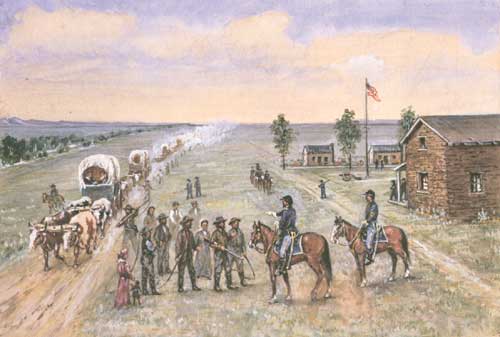
INTRODUCTION
By Marian Albright Schenk
FOREWORD
By Dean Knudsen
SECTION 1
Primary Themes of Jackson's Art
SECTION 2
Paintings of the Oregon Trail
SECTION 3
Historic Scenes From the West
 |
| William Henry Jackson always took pride in dressing well. His journals tell of his buying new shirts and studs at times when he didn't have enough money for food or rent. This personal trait must have been put to the test during his days as a bullwhacker where the hard work reduced his clothes to rags. (SCBL 2003) |

Section 2: Paintings of the Oregon Trail
FORT KEARNY, NEBRASKA TERRITORY
For people on the Old Oregon Trail, Fort Kearny in central Nebraska offered a token military presence. Established in 1848, Fort Kearny was the only military outpost between the Missouri River and Fort Laramie—500 miles to the west in Wyoming. The fort provided limited repair facilities and emergency rations could be purchased from the quartermaster. As the only representatives of the federal government on the vast High Plains, the military also provided a reassuring sense of law and order.
After three weeks on the trail, Jackson looked forward to his arrival at Fort Kearny. As he recorded his impressions in his diary:
July 11th. At last we have reached the first point or place of any importance on our route. We have thought and spoken of Fort Kearney as if it was our destination, and nothing beyond it, but now we regard it as a starting point. Here all routes converge & again diverge. We make no stop but go right on our way.1
 |
| Military campaigning during the American Civil War generally came to a halt during the winter when both Northern and Southern armies went into camp until spring. Dated February 22, 1863, this drawing—highlighted with colored pencils—depicts the miseries of these camps. (SCBL 233) |
In early August 1864, the Sioux, Southern Cheyenne, and Arapaho had attacked nearly every stage and relay station along the Platte River and had effectively shut down all traffic on the overland trails for several months. Since that time, there were periodic encounters and no shortage of rumors.
In an effort to assure relative safety, the military commander at Fort Kearny did not allow trains of less than thirty wagons to move westward. As Jackson's outfit consisted of only twenty-five wagons, they had to temporarily join up with another train often wagons. Each teamster was armed with a firearm of some kind, generally a Colt revolver was kept readily available, while an assortment of rifles, carbines and shotguns were stored in the wagons.
During his short visit to Fort Kearny, it is reasonable to assume that Jackson reflected on his own recent military experience. A nineteen year-old William Henry Jackson had enlisted in a local Vermont militia unit in 1862, and was eventually mustered into the 12th Vermont Infantry Regiment. Assigned to the Army of the Potomac, Private Jackson's regiment was ordered to guard Washington, D.C., against any Confederate threat.
Later, the 12th Vermont was transferred to northern Virginia. Stationed near Fairfax Court House and Wolf Run Shoals, Jackson's tour of duty was peaceful and uneventful. Aside from his occasional guard duty and a couple of hours of drilling each day, Jackson had plenty of time on his hands. To fill the idle hours, Jackson sketched his comrades and scenes from their daily lives.
The only time Jackson ever heard guns fired in anger was in early July of 1863. As a part of the huge Federal Army deployed to fight Robert E. Lee's Army of Northern Virginia, the 12th Vermont was relegated to the reserves during the climactic battle at Gettysburg. Jackson's regiment was never ordered to the front, and soon afterward his term of enlistment expired. Choosing not to re-enlist, Jackson was honorably discharged from the army a few weeks after the famous battle.
1. Hafen, Jackson Diaries, 44.
 |
| Old Fort Kearny. Unsigned and undated. 25.4 x 35.5 cm. (SCBL 276) |
 |
scbl/knudsen/sec2d.htm Last Updated: 14-Apr-2006 |
 |